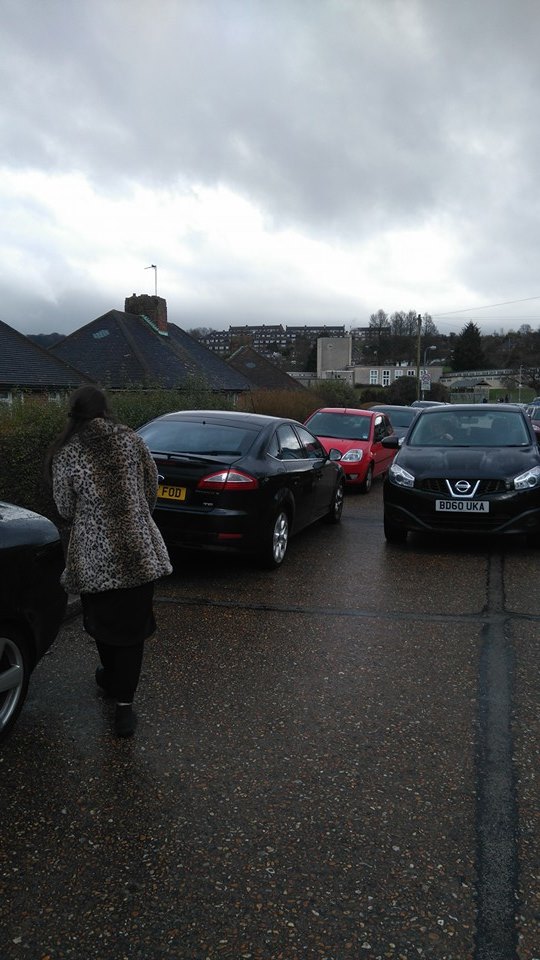The city council is asking for power to fine people who park on the pavement as part of its response to a national consultation on making it easier for disabled people to get around.

Parking on the pavement is currently banned in London, and there have been growing calls over the last few years to extend that ban across the country. In Brighton enforcement was trialled in Withdean, Patcham and North Portslade but this took special traffic regulation orders and expensive signage to set up.
Next week, the city council is to finalise its response to the Department for Transport consultation on the Transport Accessibility Action Plan, part of which will be a request for simpler powers to extend a pavement parking ban across the city.
Councillor Gill Mitchell, chair of the environment, transport and sustainability committee which will discuss the city’s response on Tuesday, 28 November, said: “Our work to tackle irresponsible pavement and verge parking has had some positive effects and we trialled enforcement in Withdean, Patcham and North Portslade. It has also highlighted the need for a more effective way to deal with what is a growing problem in the city.
“Disability groups, residents, councillors and MPs have asked for a simpler process and powers to tackle the issue, such as the outright pavement parking ban introduced in London. Parking on pavements makes getting around more unsafe for everyone but it is especially difficult for people with disabilities who are denied access or who cannot see the obstruction.”
The council goes on to highlight the amount of signage currently required to inform drivers of the boundaries of any pavement parking ban. These can cost hundreds of pounds just to protect one area of pavement behind a pedestrian crossing, making a citywide solution too costly.
In London a 1974 Act means pavement parking is banned everywhere in the city unless the signs say it is allowed. This helps protect London’s pavements from the damage caused by parked vehicles.
Brighton and Hove’s response also details local good practice in dealing with fraudulent use of Blue Badges for parking and the partnership with Brighton and Hove bus company to make it easier for people with disabilities to travel on public transport.










The growing problem in the city is a lack of legal parking places even for residents.
But that is the council aim (esp. the last one) where they want to restrict parking to encourage use of sustainable transport.
The problem is that many households have multiple vehicles due to relatively low costs for running a car and the “dream” of everyone to have their own. This is even worse with houses in multiple occupation (HMO) where sharing of vehicles is even less likely.
Next door to me, at one time, they had 4 cars and their next door neighbour had another 3. They had garages but never used them for storing cars and used their front drives for 5 vehicles. The remaining 3 were parked on the pavement outside my house because they were too lazy to park them further away.
When I complained about their cars blocking access to my drive they too complained that it was the fault of the council for not providing enough parking spaces!
Perhaps a ban on pavement parking would get people to determine how many cars they really need to have if they have to walk, perhaps half-a-mile, to get to their cars. Or perhaps they might get to use their own garages?
If pavement parking were banned on Bear road and cars parked legally on the road there would be major disruptions. Once you start these schemes they have knock on effects throughout the city. If it’s not a marked out bay, then soon the city will be covered in double yellow lines.
It sounds like a great idea, going back to how it use to be illegal to park on the pavement or not to park in the direction of the traffic. The only problem is if everyone parks on the road in Hangleton, what will happen to the buses? The only way they can get through is for cars to be parked half on the pavement and half on the road.
Gerald is right – in real terms car ownership has become steadily cheaper so more people can own a car, and some individuals own more than one vehicle. This is fine if they have somewhere to park the car when not in use. But in many places there is not enough land to go around. And all too often people who have gardens/garages they could park in but apparently they find it too much trouble – so park on the nearest convenient pavement. Ultimately if a person wants to own a car it is his/her responsibility to find a safe and legal place to park it. Don’t just dump it on the nearest pavement and expect everyone else to work around your needs. Unless something is done now, the problem will only get worse and we will end up running out of pavement as well as road.
I reported a car opposite my house that continually parks on the pavement, making it very difficult for wheelchair users prams etc to walk on the path. I reported the car to the police who then passed it on to the council who informed me that because there are no road restrictions it was fine… so fine if someone gets knocked over for having to walk on the road on a blind bend????????
erm. yeah
New signs on Carden Avenue not to park on verges took a long time to cone after the pub became a shop & the grass was churned up to mud